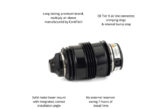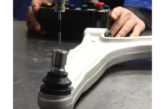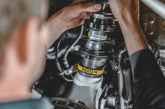PMM examines the Verification of Lubricant Specifications (VLS) and its role in the motor industry by putting the questions to VLS Chairman, Andrew Goddard.

PMM: Tell us a bit about VLS – the organisation’s background, history etc.
Andrew Goddard (AG): In 2013, the lubricants industry faced a problem. Some lubricant products were being sold in the aftermarket by new entrants with claims that just did not seem to be believable. Closer inspection found that occasionally substandard formulations provided by newly established companies were being passed off as the latest specifications, or even failing to perform effectively at low temperatures.
The vast majority of lubricants sold in the UK market at the time were fully compliant with all necessary market specifications. However, out of the growing concern, reputable lubricant blenders and manufacturers came together to launch the Verification of Lubricant Specifications (VLS). VLS is an industry-led service that independently validates complaints regarding the technical specifications and performance claims of products. Since its inception in November 2013, VLS has reviewed and made decisions on 49 different lubricant complaints, from cold weather properties through to compliance with industry standards and market regulations.
PMM: How does VLS’ work impact independent garages and mechanics?
AG: Although the service is aimed at resolving product complaints that are often made between different lubricant companies, the overall objective is to protect garages, as well as end user motorists, by creating a transparent and open market for the purchase and sale of lubricant products. This means that those working in the trade can be assured that lubricants are what they say they are and can do what is claimed. Our work allows professional mechanics to safeguard their reputation by being confident that the lubricant products they are buying and putting in their customers’ vehicles are suitable for use and not going to damage vehicles. Everything from engine to transmission and gear oil is covered by the scheme.
PMM: What particular challenges is the lubricants industry facing?
AG: Car lubricant is an increasingly complex area. New Euro VI regulations place increased pressure on car manufacturers to reduce emissions. At the same time, drivers are becoming more demanding when it comes to performance. Passenger Car Engine Oil has also been subject to immense pressure to support the trend for smaller, more fuel efficient but also more powerful engines. Car manufacturers today are demanding thinner and lighter engine oil viscosities to enhance fuel consumption in a smaller more powerful engine, while at the same time reducing emissions.
Yet over the past few years we have seen the average age of cars on the roads rise quite dramatically. The recession of 2008 caused people to think twice and many have hung onto their cars for longer than they might have done previously. This means garages have to increase their lubricant stock holding – catering for older cars whose manuals denote outdated or even obsolete grades and brands of engine oil, as well as newer, thinner viscosities for more modern vehicles.
This could also add to complexity that already exists in the lubricant sector. If the choice of engine oils can already be confusing then catering for ageing vehicles on the roads, as well as cars requiring newer engine oil specifications, could see garages and motorists caught in the spotlight. VLS is working hard to bring transparency to the lubricant marketplace and protect and educate end users so they can feel confident in their selection.
PMM: What can mechanics do if they have concerns about a particular lubricant product?
AG: If mechanics have any concerns that lubricant products are being offered at prices that appear too good to be true or lubricant packaging is in any way misleading, they can report them to VLS by calling 01442 875922 or emailing admin@ukla-vls.org.uk.











